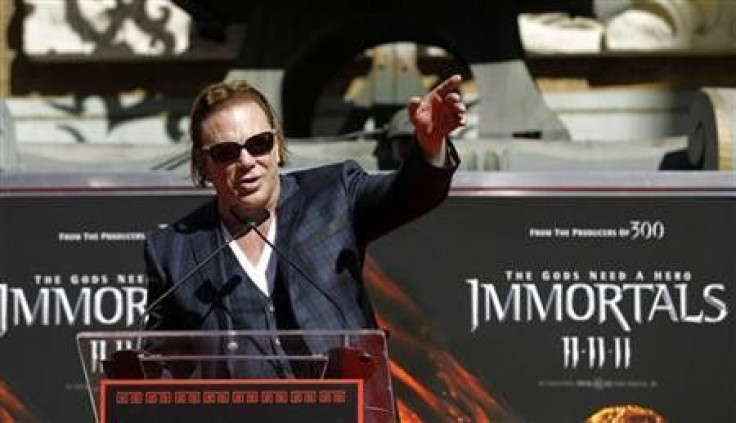A Minute With: Mickey Rourke Talking 'Immortals'

Mickey Rourke, known for years as a Hollywood bad boy, was perhaps the perfect choice to portray a bad boy of Greek mythology, brutal King Hyperion, in the 3D action movie Immortals opening in theaters on Friday.
Directed by Tarsem Singh, the movie sees Rourke's evil king on a murderous mission to vanquish both humankind and the Gods of Olympus. But he meets his match in a young stone mason named Theseus (Henry Cavill) who wants to avenge his mother's death.
With the help of an Oracle (Freida Pinto) Theseus learns that it is also his destiny to stop Hyperion and save mankind.
Rourke spoke to Reuters about the film, overcoming his bad boy reputation and his beloved chihuahuas.
Q: King Hyperion is physically imposing and wears intricate face masks that almost look like weapons themselves. Was it a challenge wearing all that gear?
A: There was a lot of stuff to put on. The shoes were 12 pounds (5.4 kgs) -- apiece. I took three wardrobe assistants to put on each little piece of paraphernalia because it was all layered.
Q: How was the shoot itself?
A: I had just had bicep surgery in Heidelberg, Germany. I tore my bicep and the operation didn't work. Three weeks after the operation I lost my whole tendon, then the movie started. We shot during a sort of rehabilitation period for me so I wasn't really able to do much.
Q: Did getting a best actor Oscar nomination in 2009 for The Wrestler change things for you in Hollywood?
A: Probably to a degree. The reputation I had for 20 years about being difficult and unprofessional is always going to stay. A lot of it was true, but I'm not really that way anymore. I am my own man, and I'm never going to just march to anybody's beat. But I was out of work for 12 years because of the mistakes I made. I don't blame anybody else but myself. I can't make the same mistakes again. I'd be foolish. Those years out of work were a terrible, lonely, pathetic, desperate time.
Q: Now that you have this new lease on your career, how can you sustain it so you don't lose it again?
A: Well, it's a younger generation of directors and producers that I'm working with. Its not all the people that I (upset) so terribly. Most of those are out of the business or retired, thank God. The young filmmakers are fearless. (Darren) Arnonofsky, (Robert) Rodriguez, Tarsem (Singh), they don't care what people said about me 20 years ago.
Q: You're known for your love of chihuahuas -- your 18-year-old Loki passed away just days before the 2009 Oscar ceremony. How's life without her?
A: I'm never going to be over her. You have that 18 and a-half year relationship. It's the longest I've had with anyone, with anything. When they wanted to give me a star on Hollywood Boulevard, I said 'I'll take it if they can put Loki's name there too.' They said 'no,' so I said 'no. If I can't have Loki's name there, I don't want my name there.'
Q: Your next project is a screenplay you wrote called The Beautiful Game, the real story of Gareth Thomas, the Welsh rugby star who announced he was gay. Where are you at with that?
A: I've been training for six months physically and will train another six, then take three months to work on the Welsh accent. Hopefully by the end of March we can shoot in Wales.
Q: From a professional boxing career to starring in movies about wrestling and now rugby -- you really gravitate toward sports, don't you?
A: That's what I love the most and that's what I miss the most. When you get to an age where you're getting too old to play sports or you can't play like you used to, it's a terrible feeling. You feel like you're slowly decaying. This will be the last time that I'm going to be able to get it up -- one last time to get physical -- at a point where I could still be respectable.
Q: What do you want your legacy to be?
A: I don't want one. When I'm dead and gone, I won't care what they say about me.
© Copyright Thomson Reuters 2024. All rights reserved.











